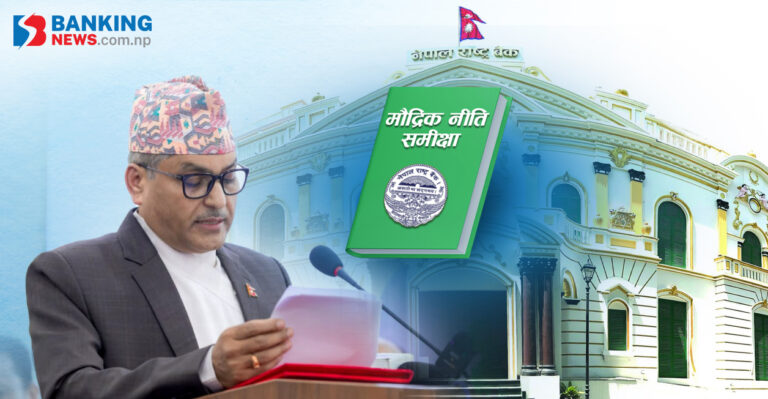Banking News – Nepal Rastra Bank (NRB) has begun reviewing the mid-term monetary policy for the fiscal year 2080/81. This will be the final monetary policy review under Governor Maha Prasad Adhikari. Since this is his last review, expectations are high that it will follow the trend of being a more relaxed monetary policy.
For the review, NRB has already collected suggestions from various sectors, including the Nepal Bankers’ Association (NBA), the umbrella organization of commercial banks. The NBA submitted its recommendations to the central bank this week.
Since this is Governor Adhikari’s final policy review, there is widespread interest in how it will unfold. Adhikari has faced significant economic challenges since assuming office, and there is pressure on him to introduce reforms in this final review. Currently, the banking sector is grappling with various problems—there is a surplus of NPR 600 billion in investable funds, while interest rates remain at historic lows.
Non-performing loans (NPL) have risen to an average of 4.5%, and non-banking assets have exceeded NPR 38 billion. This has pushed the banking sector into one of its most challenging phases in the past decade. Given this scenario, banks are closely watching the monetary policy review, hoping for policy easing from NRB in the upcoming review scheduled for Falgun.
A CEO of a commercial bank stated that the suspension of financial support for the construction sector since Mangsir has exacerbated the situation. “Previously, the refinancing and loan restructuring facilities provided to the construction sector were helping, but since those were halted in Mangsir, the banking industry has faced additional challenges,” he told Banking News. He also warned that if NRB provides excessive relief, even those capable of repaying their loans might default.
Despite some positive steps taken by NRB at the beginning of the current fiscal year, banking experts like Anil Raj Bhattarai believe the central bank must address existing banking challenges through this review. “NRB is aware of the financial sector’s issues and the solutions needed. We trust that the monetary policy review will reflect this understanding,” Bhattarai stated.
Need for a Policy on Asset Reconstruction Companies (ARC)
The current fiscal year’s monetary policy had proposed the establishment of a company to manage non-banking assets. Based on this, the government has already made policy arrangements to operate a Bad Bank (Asset Reconstruction Company). However, given the rising NPLs, bankers are calling for the establishment of an Asset Management Company through the upcoming policy review.
A Deputy CEO of a commercial bank emphasized the necessity of a full-fledged Asset Management Company in the next monetary policy review. “With rising bad loans, an asset management company is now crucial. Although the refinancing facility for the construction sector ended in Mangsir, the problems remain. There should be additional relief measures for the construction sector at least until Asar,” he suggested.
Similarly, Upendra Poudyal, President of the Confederation of Banks and Financial Institutions Nepal (CBFIN), pointed out that delays in payments to contractors have increased loan defaults in banks. “The government should ensure timely payments to various sectors, and NRB should extend deadlines where necessary. While interest rates and liquidity levels are currently stable, policies should be introduced to ensure money circulation among people,” Poudyal emphasized.
NBA’s Key Recommendations to NRB
The Nepal Bankers’ Association has already submitted its suggestions for the upcoming monetary policy review, highlighting the following key points:
- Interest Rate Spread: The association argues that the current regulation on interest rate spread contradicts the principles of an open market economy. Hence, it has recommended a gradual elimination of this provision through proper study.
- Digital Transactions: To promote digital banking, the association has urged NRB to allow banks to charge fees for clearing checks below NPR 200,000.
- Dormant Accounts: As fraud risks increase due to inactive bank accounts, the NBA has requested policy provisions for the closure of such accounts.
- Pending Payments to Contractors: Since contractors have not received their due payments from the government, the NBA has recommended special measures to address their liquidity concerns.
With mounting concerns over liquidity, rising bad loans, and stalled payments in the economy, the banking sector is looking to NRB’s monetary policy review for much-needed relief and reforms.



 About Us
About Us
Comment